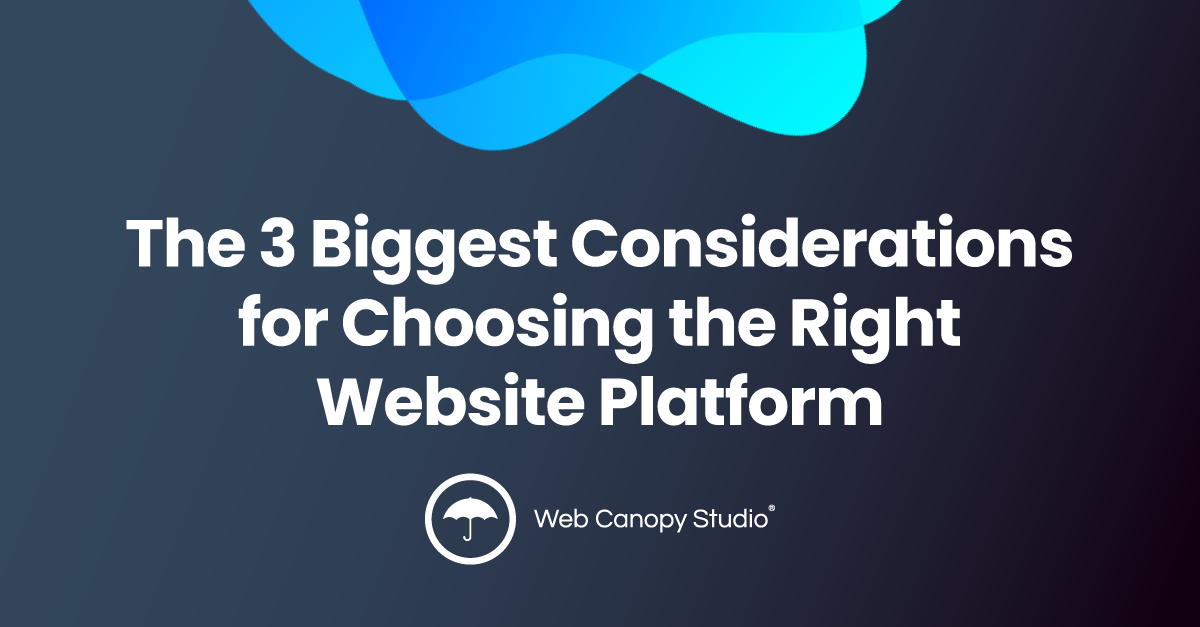Whether you’re evaluating a new website platform today or it’s something you're planning for in the future, this is the core piece of what your website should be built on.
I don't know how many other agencies, gurus and blogs are explaining what to look for in a website platform, and first off, they're all wrong.
It drives me nuts how people are trying to promote features when choosing a website platform!
If it's coming down to very tiny nitty-gritty details, then maybe the features are the selling point.
But rarely should you be looking to establish what website platform you’ll be working with because of a feature.
The reality is that there are three very important considerations that we have to make sure that we are exploring.
The three most important things to consider when choosing what platform to put your website on are:
- Goals
- Usability
- Reporting
Before we dive into what considerations to take when selecting the right website platform, it’s important to understand how it all ties into the Website Conversion Framework.
THE WEBSITE CONVERSION FRAMEWORK
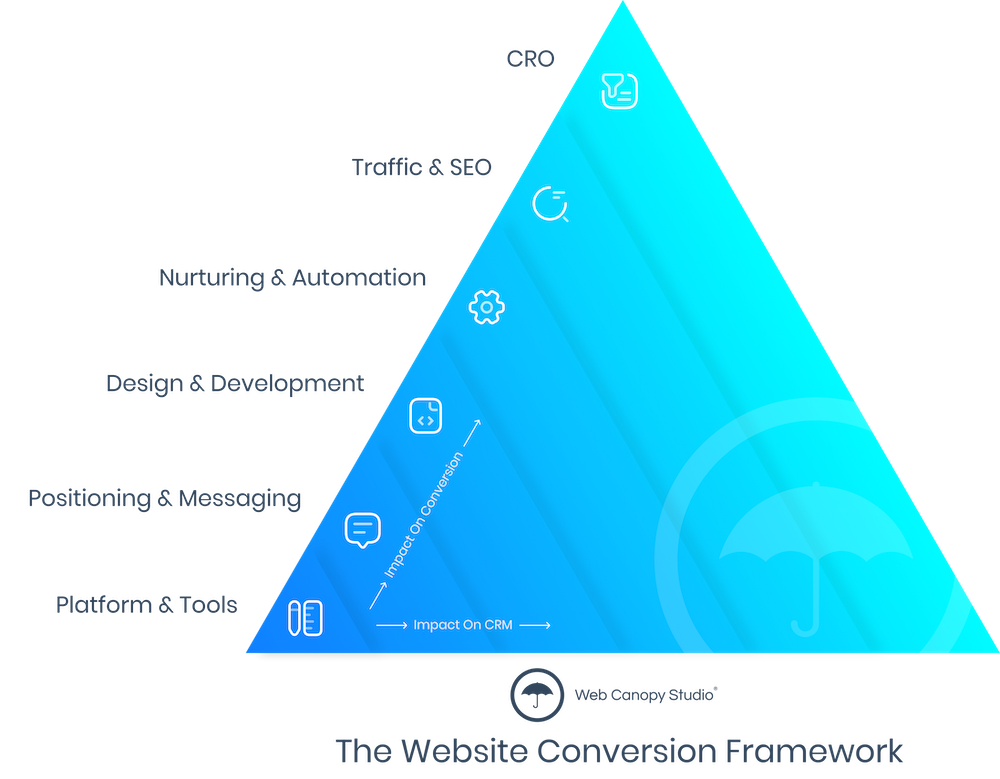
The Website Conversion Framework evaluates a website's eight conversion frameworks.
As you can see in the diagram above, there are six different components that a highly converting website must have or go through in order to be successful.
At the very root of the diagram, you can see that choosing the right platform is the most critical component of a successful website.
If the right platform and tools are not in place at the core, it will be considerably difficult and less effective as we scale-out.
Choosing the right website platform is critical.
it’s at the very base, the very foundation of the Website Conversion Framework, so we want to make a good choice.
When looking into which website platform is the right one for a client or for me, the first thing to evaluate is the goal and purpose of that website.
GOALS
What is that website truly supposed to do?
This is the first and most important piece of choosing the right platform.
Most people don't even think about this when they're trying to figure out what website platform they should choose.
I'm willing to bet most people don't even think about this when they're trying to figure out what website platform they should choose.
It is so cringe-worthy to me to see so much content and so many people talking about, ‘oh, it's WordPress versus Squarespace versus HubSpot versus all these.’
When I hear that, I think to myself, ‘you don't know, you don't even know who the people are that you're talking to.’
So why even talk about goals and purpose?
Why is that something that we should even consider or think about?
Well, all of these website platforms are very valid.
There's not one that is just better than the other across the board for every single industry and for every single use.
I am a firm believer that each website platform has its own key specific time and place.
Online Shopping
For example, the one that is plain as day to me is shopping, right?
If you're an e-commerce platform and the primary goal of your website is to sell something online, then your website platform should be rooted in an online eCommerce platform.
In that case, it should be something like Shopify, where your website actually lives.
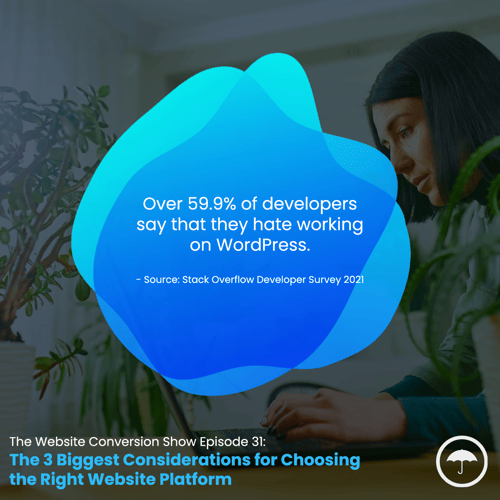
Now, I know that there are lots of integrations and things that you could do to combine different components, and I think that's all great and super important.
I don't know how many websites we've done where we've tied Shopify into HubSpot, and that works very well.
If online shopping is your primary goal for your website, it would not make sense to house your primary website somewhere else.
If so, you would have to keep sending data to different platforms, different integrations, and different plugins, which makes no sense.
Also, it doesn't make sense to focus on using plugins as the primary source for your shop.
If shopping were the secondary component, it’d be understandable. But if it's the primary component, that doesn't feel right.
With shopping, I think you have to go with an e-commerce platform like Shopify.
Blogging
However, if your primary purpose is blogging and content distribution and thought leadership like news networks and the like, go with a platform that is built for blogging and content distribution and sharing.
I think WordPress does this extremely well.
You could even think about something like Medium because it's already built and structured for sharing content and blogging.
In reality, though, all of them have the capacity to do that.
HubSpot is great for content creation, sharing, and distribution, but WordPress was built for it; that’s its core functionality.
In fact, if you want WordPress to be a website or do lots of other things, you'll probably have to insert several other plugins just to make it do things it wasn't actually designed to do.
But it is designed to be a blogging platform, which is why it was built in the first place.
Lead Generation
If you’re looking to run a marketing-based website that's designed to get people to your site to read content, I think your website needs to live on the same platform as your CRM.
When your website's purpose is about converting visitors into leads and booking calls on your sales team's calendar, it only makes sense to have the CRM already built natively into the background of that website.
This way, there is no lost data and we're not sending information back and forth.
It would not make sense to have a third party running my website that sends information elsewhere through plugins and zaps when that is the core reason why my website is in existence today.
You wouldn't want a 3rd party plugin running the back end of a nuclear reactor. You wouldn't want a 3rd party plugin being responsible for all the data and tracking of a rocket system. It just wouldn't be right.
So why do people do this with their website? It just doesn't make sense.
If you're using your website to generate leads, then there is really no other option than HubSpot in my opinion.
Online Courses
Another example would be looking at online courses.
If that's the primary focus of what you're doing, I would think of something like Kajabi.
There are several others out there (Thinkific is another phenomenal option).
However, for ease of use, tracking sales, and control over the visibility of your program, Kajabi is the winner here for me.
So the very first consideration you need to have is: what is the goal of my website and what is its purpose?
If your answer is lead generation, then you need to think about having a lead generation platform to house your website, like HubSpot.
If you’re just looking to share content and be like a news outlet or a journalist and just share blogs with the world, then Medium or WordPress could be a good fit.
That's not to say that you can't do other things with other platforms, but choosing the right one based on your goals will help streamline the functionality for your needs.
After you examine and determine what your goals are regarding the website, you will need to consider usability.
USABILITY
Who is editing and maintaining your website?
How easy is it for you to make changes to your website on the platform that you're exploring?
If you are moving to or staying on a platform that is very difficult to make adjustments to, I cannot tell you enough how many headaches that you are putting yourself through.Do you want to have to reach out to a developer to just make modifications on the site?
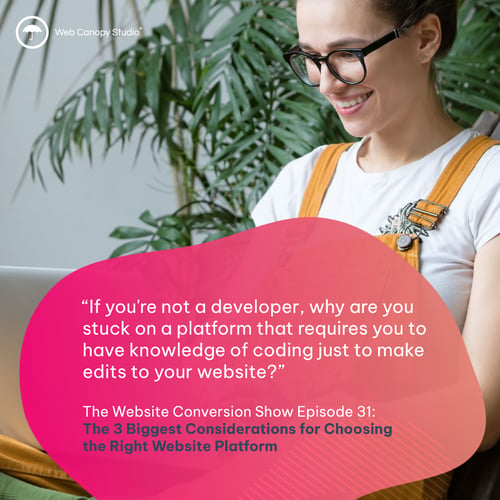
If you are a marketer or a business owner, why be stuck on a platform that requires you to know coding or development?
It blows my mind. It’s just worth it, and it doesn’t make sense to do that.
I can't tell you how many times I've heard people come to Web Canopy Studio and say, ‘oh yeah, I'd love to make more changes on my website, but I have to reach out to my developer.’
That’s a challenge, and it puts people in situations that make them feel stuck.
So when you're evaluating the platform of choice, the second thing to me boils down to usability.
The third consideration that I'm looking at is reporting and attribution.
REPORTING & ATTRIBUTION
Do you have native reporting for tracking revenue & performance?
I think most people seem to look over-reporting and attribution or they just see it as a feature, but in reality, it’s very important.
Ask yourself: Do I have access to track the performance, pages, section and content of my website back to revenue and to the overall performance of that page or section of the site?
Can I do it without having to use third parties, plugins, integrations, or send content back and forth to reporting platforms?
Yes, totally. You could do it all with a million different tools.
You can send it to programs and have them analyze it, and it comes back with really pretty charts with graphics.
I understand all that. It can be done, but I would much rather have all of it in one place.
I would much rather be able to, with the click of a button, see my reporting data and understand why an issue is so critical and what this actually gives me in return.
There's a lot to it that I think a lot of people overlook.
Why this is absolutely critical
Let me just kind of walk you through an example of why it’s important to have easy access to reporting data.
A few years ago, we had a client whose website was on HubSpot.
However, they were considering moving off of HubSpot and going to WordPress.
We were working with the marketing director, but the CEO of the company was upset about the website because he thought it didn't tell enough of the company's story.
His thing was: ‘we've been in business for 25 years and we've been servicing this local community for all this time. And these are our accolades and our awards and why we're so great…’ Blah, blah, blah.
He thought the content was too plain.
The actual content that we put on the website was problem-focused and problem-specific, so it was really tailored to the audience for conversion.
It was focused on getting people to take action and convert while they were on the website.
And so when we caught wind of that, all we needed to do was click on the back end, go to the back end of that page, go to the back end of that site and show the attribution reporting to them.
That functionality of the website was already built-in natively, and it wasn’t necessary to create any special reports.
There was no need to tie in any plugins; literally, it was just there for us.
And we were able to say, “I hear you, what you're looking for, what you're saying is important, and there is a place for that.”
It’s true that we need to share the credibility, the accolades, and the longevity of the company.
Should it be the main theme of the website?
I don't think so, so I had to show him, “here's why, here's the data that will tell us otherwise.”
And so we were able to look at campaign reports inside of HubSpot and at individual page performance.
What we showed them was, ‘here are all the deals that are attributed to the kinds of content that your website is really doing well.’
And, ‘here's all the revenue that's attributed to the website performance and the website content.’
It did nothing but validate and back up our client, who was the marketing director, to stand on her own two feet, and not just get pushed around by the CEO.
So it was really quite helpful, and it eliminated the need to go back and start discussing, “Should we bring WordPress back into the mix or not?”
All of this is just an example.
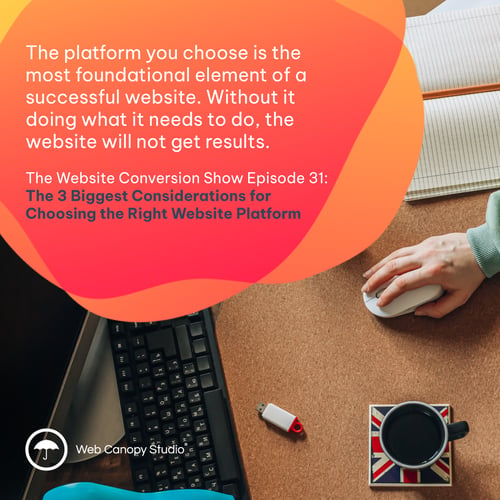
The other situation is that a lot of people bring up the cost factor.
Cost is very important, but is it in the top three considerations?
It's not. I wouldn't even bring it into the mix, especially depending on where you're at as a business.
Here's why: when you insert the issue of cost into the discussion, you bring up things like, "well, WordPress is free and it’s easy for me to just be able to not have to worry about an extra expense of something like HubSpot CMS Hub."
This is a battle that we fight all the time with people who are thinking about new websites and platforms.
The reason why that's an issue is that the amount of time that is lost in dealing with a free CMS and with the headache of coding and having to rely on a developer is absolutely ridiculous.
It's sky-high. There's so much time lost, so much opportunity lost because of the things that are not being done to the website.
Think about all the potential customers and potential leads that your company’s site is missing out on because you’re just simply on the wrong platform.
Remember that there’s opportunity constantly, and when changes can’t be made within the timeframe that you’d like, it will hurt.
I heard a statistic the other day about Stack Overflow, which is a great online resource, lots of content, and a very well trusted source, where they reached out to all these different developers in an annual survey.
According to them, WordPress was the number one most hated platform by developers, which was crazy.
Over 59.9% of developers say that they hate working on WordPress.
The next thing down was IBM, then Windows, and then Android devices.
And so WordPress beats out every other platform as the most hated, even though the others aren’t even website platforms!
THE BOTTOM LINE
We went over the goals, the usability, and the reporting functionality when considering a website platform.
Those are the three things, and they’re tied back to the Website Conversion Framework.
Again, that's the core, that's the bottom piece, the most foundational element of a successful website–the platform it’s on.
If the platform isn’t doing what it needs to do and being where it is, the website can't function.
I think, after all that being said, that there's a place for all these different platforms.
There's a time and a place and an industry where it's really important to think about, ‘should this be used or shouldn’t it?’
But at the end of the day, we've got to choose the right one for us.
